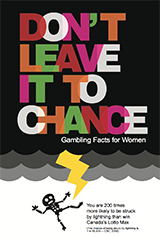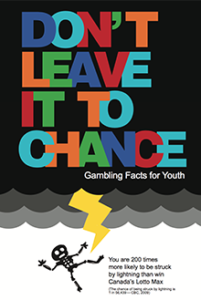Principal Investigators: Dr. Flora Matheson and Dr. Alireza Sadeghian (Ryerson University)
There are significant gaps in Canada’s current mental health and addiction services for people experiencing problem gambling. Problem gambling is often associated with substance use, mental illness, trauma, chronic illness, and disability. There is a strong association between problem gambling, poverty, and homelessness. Addressing these interconnected needs requires an integrated care approach that pairs self-management with service provision, a model which largely does not exist in Canada. Working with community partners and people with lived experience, we are designing, developing, and evaluating a mobile application to support people experiencing problem gambling.
The project is funded by CIHR/NSERC Collaborative Health Research Projects grant (2019 – 2022).
Principal Investigators: Dr. Flora Matheson and Dr. Alireza Sadeghian (Ryerson University)
There are significant gaps in Canada’s current mental health and addiction services for people experiencing problem gambling. Problem gambling is often associated with substance use, mental illness, trauma, chronic illness, and disability. There is a strong association between problem gambling, poverty, and homelessness. Addressing these interconnected needs requires an integrated care approach that pairs self-management with service provision, a model which largely does not exist in Canada. Working with community partners and people with lived experience, we are designing, developing, and evaluating a mobile application to support people experiencing problem gambling.
The project is funded by CIHR/NSERC Collaborative Health Research Projects grant (2019 – 2022).
Principal Investigator: Dr. Flora Matheson
Research on problem gambling and homelessness is predominantly male focused. This project is the first in Canada to research problem gambling among women experiencing homelessness. We collected data to determine the prevalence of problem gambling among women who seek shelter services in Toronto and Hamilton, Ontario. We also interviewed 29 women in these cities about their experiences of precarious social and financial situations (e.g., single parenthood, interpersonal violence, immigration, debts, and unemployment), marginalization, and vulnerability to problem gambling.
This project is funded by the Social Sciences and Humanities Research Council of Canada (SSHRC).
Principal Investigator: Dr. Flora Matheson
Agency Lead: Dr. David Lynch, Good Shepherd Ministries
According to Dr. Matheson’s research, there is a strong tie between homelessness and problem gambling. Services for people experiencing these concerns and other health needs are scarce.
In partnership with The Good Shepherd Ministries, we implemented a new Gambling Addiction Program to confront problem gambling and homelessness among men and women experiencing poverty and homelessness. The program provides clients with support and services for problem gambling and other co-morbidities, also offering skills training, goal setting and crisis intervention. In this project, we evaluated the effect of the program on reducing harms associated with gambling including financial and housing precarity.
This project was funded by the Trillium Foundation under the Local Poverty Reduction Fund.
Principal Investigator: Dr. Flora Matheson
Our team, including a Community Advisory Committee, and four talented students with backgrounds in film, journalism, graphic art and nursing, has co-created multimedia tools to communicate the link between problem gambling and homelessness. These knowledge translation products feature documentary film, visual art, storytelling and a workshop.


We produced:


See them on gamblingandpoverty.ca.
This project is funded by the Gambling Research Exchange Ontario (GREO)
Principal Investigator: Dr. Flora Matheson
Research on problem gambling and homelessness is predominantly male focused. This project is the first in Canada to research problem gambling among women experiencing homelessness. We will collect data to determine the prevalence of problem gambling among women who seek shelter services in Toronto and Hamilton, Ontario. We will then interview 20 women in each city about their experiences of the relationship between precarious social and financial situations (e.g., single parenthood, interpersonal violence, immigration, debts, and unemployment), marginalization, and vulnerability to problem gambling.
This project is funded by the Social Sciences and Humanities Research Council
Principal Investigator: Dr. Flora Matheson
Agency Lead: Br. David Lynch
According to Dr. Matheson’s research, there is a strong tie between homelessness and problem gambling. Services for people experiencing these concerns and other health needs are scarce.
The Good Shepherd Ministries partnered with us to implement a new problem gambling and homelessness intervention program for both men and women. The program provides clients with support and services for problem gambling and other co-morbidities, also offering skills training, goal setting and crisis intervention. In this project, we are evaluating the program to see how it’s helping clients, and identifying ways it can be improved.
This project is funded by the Trillium Foundation under the Local Poverty Reduction Fund
Principal Investigators: Dr. Flora Matheson and Dr. Sara JT Guilcher
Optimizing Support is a multi-deliverable study that will give people experiencing problem gambling (PG) and other health and social needs an alternative treatment option.
Firstly, we are creating a Smartphone app to help people self-manage their problem gambling. Developed in collaboration with Dr. Sara Guilcher’s research team at the University of Toronto, the Good Shepherd Ministries, the Jean Tweed Centre, Fred Victor and the Biomedical Zone, the app will also be used in problem gambling service delivery.
It will be informed by:
Secondly, we will be using Concept Mapping to conduct brainstorming sessions with a variety of healthcare providers to understand what knowledge, strategies and resources are needed to improve screening and treatment for PG.
This project is funded by the Ministry of Health and Long-Term Care.
Principal Investigators: Dr. Flora Matheson and Dr. Andrew Pinto
In one of our previous studies, we found that many healthcare providers feel uncomfortable screening patients for problem gambling. In this project, we wanted to learn why.
We surveyed healthcare providers at St. Michael’s Hospital to know how they document problem gambling in electronic medical records and how they approach the topic of gambling to their patients. Our questionnaire was also embedded with information about gambling and gambling-related harms to raise their awareness. It assessed whether this information improved their understanding of problem gambling as a health issue, and also inquired about barriers to documentation. We found that the problem gambling documentation rate is 1 per 1000 patients, however, the prevalence of problem gambling in Ontario is estimated to be between 1% to 2.2%. Chart reviews indicated that the embedded gambling screening tool was not used by the Family Health Team Physicians and Allied Health Professionals. Also, health care providers said they would like to change their approach to PG and intended to use gambling screening tools.
This project was funded by the Gambling Research Exchange of Ontario (GREO).
Principal Investigators: Dr. Flora Matheson and Dr. Janet Parsons
Creative activity is a beneficial approach to recovery that can foster personal and social renewal. It is a known need in service delivery for women experiencing concerns with gambling and isolation. Dr. Janet Parsons from St. Michael’s Hospital and I are creating a free art program for women experiencing gambling concerns. It will be led by two occupational therapists, Dr. Clara Juando-Prats and Isabel Fryszberg, and informed by staff at the Jean Tweed Centre and Fred Victor, where the program will be delivered.
These exciting weekly workshops are modeled after Isabel Fryszberg’s art program for people experiencing mental health and substance use concerns, and Dr. Clara Juando-Prats’ art program for marginalized youth. Women will be invited to paint, draw, write songs, play music, journal, and create collages in a positive and communal space. The program will aim to reduce gambling-related harms, and promote a shift in identity from “person who gambles” to “artist.”
If you or your organization is interested in joining our advisory group for this program, please contact Parisa Dastoori at DastooriP@Smh.ca.
This project is funded by the Gambling Research Exchange of Ontario (GREO).